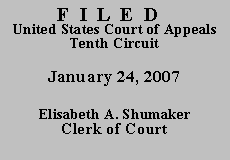 UNITED STATES COURT OF APPEALS
UNITED STATES COURT OF APPEALS
 UNITED STATES COURT OF APPEALS
UNITED STATES COURT OF APPEALS
| ANTHONY R. MARTINEZ, |
|
| v. | |
| ALLEN ZADROGA,
KEN CRANK, and BARRY PARDUS, Defendants-Appellees. |
|
Before HENRY, BRISCOE, and O'BRIEN, Circuit Judges.
The terms of 28 U.S.C. § 1915(e)(2)(B), the in forma pauperis statute, make clear that we may not reach the merits of a prisoner's claim where it is frivolous. A claim is frivolous in the context of § 1915 if it "lacks an arguable basis either in law or fact." Neitzke v. Williams, 490 U.S. 319, 325 (1989).
Mr. Martinez raises two Eighth Amendment claims. First, he avers that Mr. Crank and Mr. Zadroga violated his Eighth Amendment right to be free of cruel and unusual punishment when they launched a barrage of verbal assaults at him while he was confined in isolation after a suicide attempt. Mr. Martinez also alleges that Mr. Crank and Mr. Zadroga used physical force to place him in restraints while he was on suicide watch.
As to Mr. Martinez's first claim, it could be that despite the age-old saying, words may be hurtful; nevertheless, something more akin to sticks and stones is required to state an Eighth Amendment cause of action. McBride v. Deer, 240 F.3d 1287, 1291 n. 3 (10th Cir. 2001) ("[A]cts or omissions resulting in an inmate being subjected to nothing more than threats and verbal taunts do not violate the Eighth Amendment"). With respect to his second Eighth Amendment claim, a prison guard's use of force only gives rise to a cruel and unusual punishment claim if it involves "the unnecessary and wanton infliction of pain . . . ." Whitley v. Albers, 475 U.S. 312, 327 (1986). Mr. Martinez fails to allege that Mr. Crank and Mr. Zadroga used more force than necessary or that they placed him in restraints with the intent of harming him, or that they acted with deliberate indifference to his health and safety. Thus, Mr. Martinez has failed to state an Eighth Amendment claim.
Next, Mr. Martinez contends he was deprived of his due process rights under the Fourteenth Amendment when Mr. Crank and Mr. Zadroga "both filed false statements [and] by oath filed false statements." Rec. doc. 3 at 5. In order to state a due process claim, a prisoner must first demonstrate that he has been deprived of some liberty or property interest. See Board of Regents of State Colleges v. Roth, 408 U.S. 564, 569 (1972) ("The requirements of procedural due process apply only to the deprivation of interests encompassed by the Fourteenth Amendment's protection of liberty or property."). Even when read with the most searching eye, it is difficult to discern from his complaint or the record what constitutionally protected interest Mr. Martinez claims to have been infringed as a result of the alleged falsehoods. As he points out, the disciplinary proceeding against himwhere Mr. Crank and Mr. Zadroga presumably uncorked the untruthswas dismissed. Rec. doc. 3 at 20.
Inasmuch as Mr. Martinez complains about his assignment to a segregation unit, he has failed to state a Fourteenth Amendment claim. In order to rise to the level of a constitutional violation, a prisoner must prove that his new confines pose an "atypical and significant hardship . . . in relation to the ordinary incidents of prison life." Sandin v. Conner, 515 U.S. 472, 484 (1995). Mr. Martinez makes no such assertion in the instant case.
Finally, Mr. Martinez avers that Mr. Pardus, the prison's director of medical services, is imposing excessive health care costs. More specifically, Mr. Martinez claims that he is charged $5.00 every six months because he has been classified as a chronic care inmate. He also maintains that he is charged $10.00 every time he is taken to the infirmary for having a seizure and $5.00 every time he orders medication. Mr. Martinez does not state an Eighth Amendment claim because he does not allege that prison officials have denied him medical treatment due to a lack of funds or any other reason. See Clemmons v. Bohannon, 956 F.2d 1523, 1527 ("[T]he core areas of any Eight Amendment claim are shelter, sanitation, food, personal safety, medical care, and adequate clothing . . . .") (internal quotation marks omitted). Moreover, it is important to note that the Colorado Board of Prisons has heard and dismissed Mr. Martinez' grievances with respect to these charges. Rec. doc. 3 at 9. Since Mr. Martinez has raised no constitutional claim, we will defer to the Colorado state prison system with respect to the fees it charges those who make frequent use of prison medical services. See Turner v. Safely, 482 U.S. 78, 84-85 (1987) (noting that federal courts are "ill equipped to deal with the increasingly urgent problems of prison administration and reform") (internal quotation marks omitted).
Because Mr. Martinez's claims are frivolous, we DENY his request to proceed in forma pauperis. Accordingly, we DISMISS this matter and remind Mr. Martinez of his obligation to make immediate payment of the remaining balance of his filing fee. We also note that because we have dismissed this appeal as frivolous and the district court dismissed Mr. Martinez complaint under 28 U.S.C. § 1915(e)(2)(B) both dismissals count as strikes for the purposes of § 1915(g). See Jennings v. Natrona County Center Medical Facility, 175 F.3d 775, 780 (10th Cir. 1999).
Entered for the Court,
Robert H. Henry
Circuit Judge
*. This order and judgment is not binding precedent except under the doctrines of law of the case, res judicata and collateral estoppel. It may be cited, however, for its persuasive value consistent with Fed. R. App. P. 32.1 (eff. Dec. 1, 2006) and 10th Cir. R. 32.1 (eff. Jan. 1, 2007).